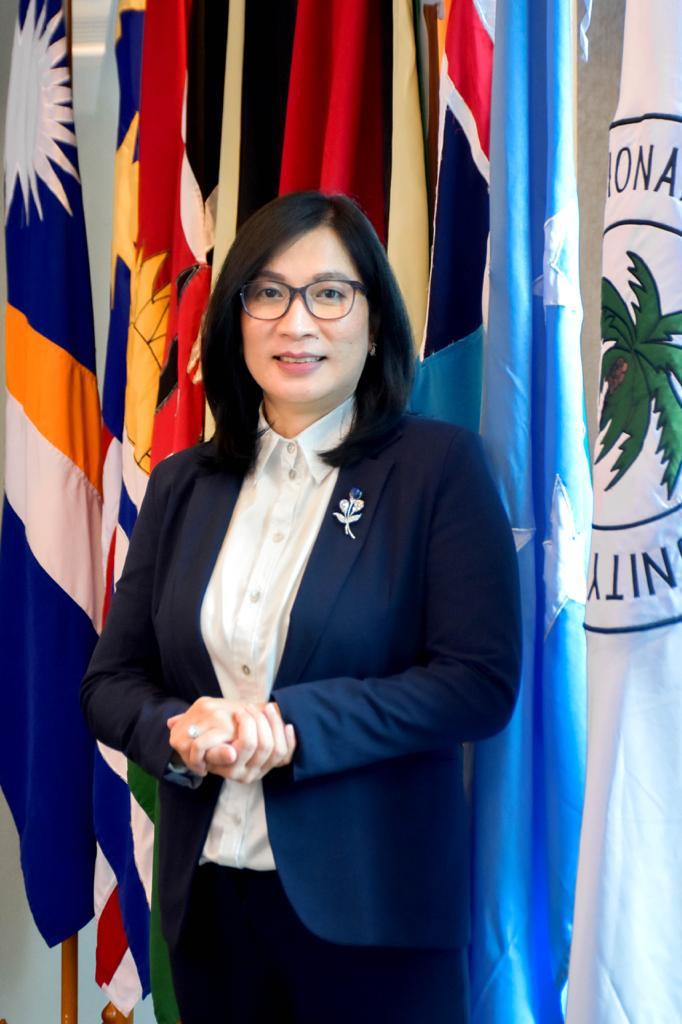- Home
- Executive Director
 Dr. Jelfina C. Alouw
Dr. Jelfina C. Alouw
She assumes charge over as Executive Director of the International Coconut Community, Jakarta, Indonesia since 2020. Prior to this appointment she was working as head of Collaboration and Dissemination Division of the Indonesian Division for Estate Crops Research and Development, Indonesia. She is an Entomologist by profession and with her 27 years of experience in the field of agriculture development, she is frequently providing technical assistance and consultancy for coconut development to farmers, coconut industries, students, lecturers and other governmental organizations. She is the author of many informative articles on coconut which were published in renowned international journals.
Speeches | July, 2025
Forging a Collaborative Future for the Coconut Sector: A Unified Strategy for Capacity Building and Policy
The coconut sector plays a vital role in meeting the economic, environmental, social, and cultural needs of countless communities worldwide. Its potential for growth is immense, but realizing it requires a unified and dynamic approach to development. A critical step in this journey is the strategic empowerment of our Coconut Development Officers and the growers they serve. To succeed, we must move beyond conventional training models and embrace a new era of genuine collaboration between government, industry, and communities.
Traditional, top-down dissemination of information is no longer sufficient for a sector as diverse and complex as coconut farming, processing, and marketing. Our officers and growers are not passive recipients of knowledge—they are on-the-ground experts, equipped with deep insights into local conditions, challenges, and traditional practices. A successful capacity-building program must be a two-way dialogue, where research-based solutions are co-created and adapted in real time, integrating scientific advances with practical field experience. This interactive model ensures that training is relevant, applicable, and sustainable. To make this vision a reality, we must implement a robust and multi-faceted strategy.
Bridging the gap between research laboratories and coconut farms requires channels that are both efficient and engaging. In collaboration with the Coconut Research Institute of Sri Lanka, PT House of Charcoal in Indonesia, and Growrite Substrates Private Limited in Sri Lanka, the International Coconut Community (ICC) is conducting a dynamic Youth Empowerment Program (YEP). This program offers young individuals hands-on internships and practical training, covering the entire spectrum from research and innovation to industrial applications.
These partner institutions and companies act as Coconut Innovation Centres and living laboratories—places where development officers and growers can see, touch, learn, and provide immediate feedback on the latest technologies and products in real-world settings. This public-private partnership is a powerful model for equipping the next generation with the skills and knowledge to transform the coconut sector.
Sound policy is the foundation of sustainable growth. By fostering a collaborative environment, we can ensure that policy decisions are informed by strong scientific evidence and grounded in economic realities. ICC’s annual Session and Ministerial Meeting brings together National Liaison Officers from member countries, along with policymakers, researchers, and industry leaders, to address emerging trends and regulatory needs. These gatherings foster mutual understanding among stakeholders, paving the way for cohesive, forward-looking policies that strengthen the entire coconut value chain.
By deepening collaboration between governments, private sector actors, and local communities, we can create powerful synergies that not only empower coconut development officers, growers and processors, but also establish a dynamic, evidence-based framework for the future. It's time for us to unite and maximize the coconut sector's potential, encouraging farmers, processors, traders, and other stakeholders to collaborate mutualistically and creatively to ensure its resilience, relevance, and prosperity for current and future generations.
